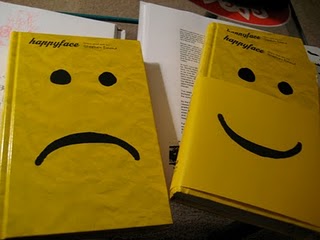Happyface reminds me a lot of one of my all-time favourite picture books, Michael Rosen's Sad Book. Like the Sad Book, Happyface deals with grief that morphs (as it so easily does) into long-term depression. It also reminds me of Sherman Alexie's The Absolutely True Diary of a Part-Time Indian in that it is heavily illustrated with the narrator's sketches, and the illustrations do a great deal to enhance the mood of the story. There's a lot going on here visually--starting with the cover. With the book jacket on, we see a happy face, but if we look underneath, the face is sad. (Just like Quentin Blake's brilliant first-page illustration for the Sad Book).
Happyface is about an artistic guy whose family falls apart in a horrible way (how horrible it is, we don't learn until about halfway through the book because Happyface can't talk about it) which leaves him feeling deeply betrayed as well as permanently grief-ridden. Happyface and his mother move to a small apartment in a new neighbourhood where his mother drinks too much and rides a private and painful emotional roller coaster, and he goes to a new school where no one knows him. Happyface decides to reinvent himself, and at first he's pretty successful. He "slaps on a grin", gets his nickname, makes friends with the cool crowd, and starts chasing a girl who's beautiful, reads Allen Ginsberg and seems to like him back. He's fooling everyone.
Of course, eventually everything crumbles around him, because a) people start digging for the truth, and b) he starts going just a little nuts, in the way that happens when you repress such powerful feelings. He turns mean and desperate. We're not even sure we like him anymore.
Emond has chosen to give us the closure of a hopeful ending, although I really felt that this book could have gone either way. Happyface mends some rifts, particularly with his father, and vows that "my problems and failures will not stop me, nor will they dictate who I am". Frankly, the ending wasn't my favourite part. What I found fascinating was how well Emond captured the complications of functioning in a depressed state, because, let's face it, Happyface is right--grief and rage are big social turn-offs for most people, particularly if they last a long time. Sometimes the mask is what saves us.
I also found the illustrations extraordinarily engaging. They're plentiful, sometimes cartoony and sometimes more artistically rendered, and they add a lot of energy and vitality to what could otherwise have been a much more sober story. Here's an interesting article written by Connie Tsu on the Blue Rose Girls blog about the process of editing a book as visual as Happyface. Enjoy!





No comments:
Post a Comment